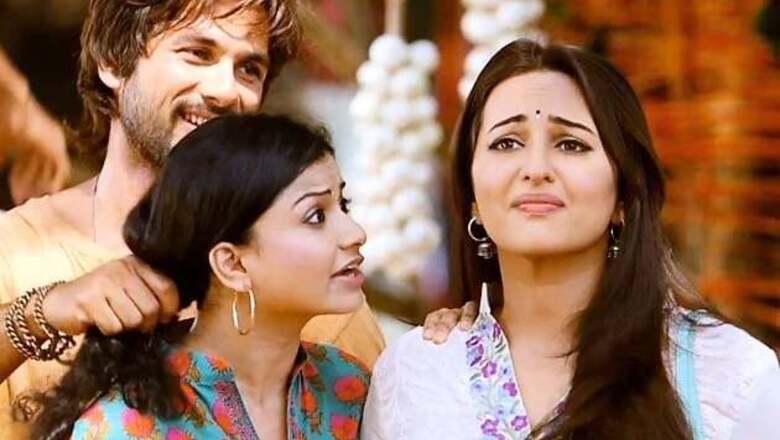
views
New Delhi: Our filmmakers do not seem to get the message despite a rise in acid attacks by rejected lovers and obsessive harassment when a woman requests that her privacy be respected. Film after film, the woman's 'no' has been translated by the lead man to mean 'yes' through some warped sense of proprietorship. And R...Rajkumar's popular song, 'Acchi baatein kar li bohot, Ab karunga tere saath.... gandi baat' sums up the message the film sends out.
Would you call it bravery if a man invades a woman's privacy? Would you find it funny when the thought of a woman becomes an obsession leading a man to slash his wrists? Some would call it stalking but for Bollywood, misrepresenting love and glorifying a certain problematic perspective of love continues to be just another way to entertain the viewers.
After Anand Rai, the director of 'Raanjhanaa', was condemned for making a hero out of a man who didn't take no for an answer and pursued the woman despite her rebuffing his advances, Prabhudeva's 'R...Rajkumar' features Shahid Kapoor as a small town stalker who leaves no stone unturned in pursuing Sonakshi Sinha until she says yes. But what's even more disappointing is the way the viewers cheered after such scenes.
To think only movies made in the recent past have made the obsessive stalker popular would be wrong. Remember how Dev Anand pestered Nutan in 'Paying Guest' was shown thrusting his attentions on her in the song 'Mana janab ne pukara nahin'? Raj Kapoor too wore a feather in his hair (to imitate Lord Krishna) to justify his boorish attitude towards Vyjianthimala in the popular song 'Mere man ki Ganga' from 'Sangam'. And Amitabh Bachchan's song 'Jumma chumma de de' is still abhorred for the way it degraded women. So are directors setting a wrong precedence by using stalkers and misogyny to sell their films? Find out what the film fraternity and cine-goers said when we asked them if they approved of Bollywood filmmakers representing the male lover as harmless but potentially threatening.
Agreed, viewers' identification with the characters in the film is fundamental to its success, but using the script to justify pestering and stalking of women is not acceptable. "Why do we get to watch films that are only about the hero pestering, stalking and thrusting their unwanted attention on their female counterparts? What's even worse is the way the makers show the hero - who resorts to such cheap tactics - getting the girl. While filmmakers incorporate such tricks to help the viewers relate to the film, they end up sending out an outrageous message - ladki ki naa mei hi haan chuppi hoti hai," rues Kirti Rai, HR professional.
Actress Richa Chadda, who is known for playing strong and inspirational roles in films, says the viewers should avoid being naive. "Bollywood is an imaginary world. I agree, movies that glorify stalking do create problems for women in reality, but the viewers too need to behave in a mature way. You have to understand the fact that movies are meant for mass consumption, and if it reaches out to those who aren't mentally stable, how can you hold Bollywood responsible for it? I counsel the viewers to avoid being gullible," she says.
With the spurt in the number of directors preferring smaller cities and towns over the metropolitan cities as the backdrop for their projects, it is quite obvious that they use 'small town love' as a strategy to win fans' approval. "Bollywood, it is high time you understood such films are in no way a simple portrayal of what happens in our society, it is a clear glorification of the stalker who pretends to be a lover," says DU student Shraddha Gupta.
Raanjhanaa's scriptwriter Himanshu Sharma too echoes the same sentiment. "It is not right to think that stalking is the only way to find love in smaller cities and towns. I don't come from a small city, but I certainly know that no girl would ever appreciate this let alone encouraging such sadak-chaap romeos. On the contrary, they'd confront such stalkers," explains Himanshu.
Akash Krishna, an engineering student, may not have liked 'Ranjhanaa' and 'R...Rajkumar', but since the actors perform their characters so well it gets difficult for him to loathe them. "There are so many people who swear by stars' on-screen personas, no matter how controversial and contradictory they are. I wouldn't be shocked if their fans also emulate them in reality," he says. But Richa Chadda believes that fans, no matter how much they support their favorite stars, aren't right in imitating stars' reel life. "Why should the viewers imitate what actors do in films? They are just playing a part. Fans copying stars who don't behave in a mature way in real life is still understood. Given the impact our movies leave on the viewers, it is important for them to practice discretion,' Richa says.
So while it is understood that the actors can't absolve themselves of their social responsibilities by playing a character that might not socially 'acceptable', movie buffs can't ignore the fact that they are just essaying a role. But if cinema is a reflection of society, shouldn't filmmakers own up their social responsibility, and not make a mockery of crimes?



















Comments
0 comment